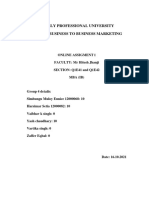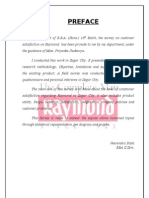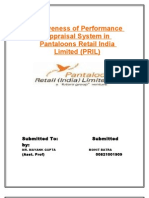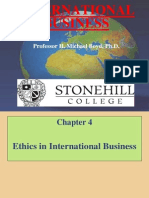Corporate Governance & Ethics: Bombay Dyeing
Corporate Governance & Ethics: Bombay Dyeing
Uploaded by
Aditya MadduriCopyright:
Available Formats
Corporate Governance & Ethics: Bombay Dyeing
Corporate Governance & Ethics: Bombay Dyeing
Uploaded by
Aditya MadduriOriginal Description:
Original Title
Copyright
Available Formats
Share this document
Did you find this document useful?
Is this content inappropriate?
Copyright:
Available Formats
Corporate Governance & Ethics: Bombay Dyeing
Corporate Governance & Ethics: Bombay Dyeing
Uploaded by
Aditya MadduriCopyright:
Available Formats
Corporate Governance &
Ethics
BOMBAY DYEING
ADITYA MADDURI
80011314026
CORPORATE GOVERNENCE AND ETHICS: BOMBAY DYEING
BOMBAY DYEING
Bombay Dyeing is the flagship company of the Wadia Group, engaged mainly into the
business of Textiles. Bombay Dyeing is one of India's largest producers of textiles. Its current
chairman is Nusli Wadia.
BOARD OF DIRECTORS
Nusli N. Wadia, Chairman
R. A. Shah
S. S. Kelkar
S. Ragothaman
K. Hirjee
S. M. Palia
Ishaat Hussain
Ness N. Wadia,
Jeh N. Wadia, Managing Director
COMPANY SECRETARY
J. C. Bham
CEO/COOs
Ashok Kaul, Chief Executive Officer (Retail Business)
Debashis Poddar, Chief Executive Officer (Textiles)
Suresh Khurana, Chief Executive Officer (PSF)
CORPORATE GOVERNENCE AND ETHICS: BOMBAY DYEING
VISION
An enterprise that generates sustainable value on the strength of trust and transparency. a
heritage that continues to inspire generations of people across time. a legacy of over 130
years, driven by THE VISION TO EXCEL.
MISSION
To create, maximize and sustain long term shareholder value.
VALUES
Our values have guided our path to success over the last three centuries. These values are the
foundations of our organisational culture and regulate the contours of our day-to-day interaction with
each other. Our values ensure that we govern through a culture of integrity, excellence, respect,
teamwork and trust.
CORPORATE GOVERNENCE
At Bombay Dyeing we have formulated and adhere to a set of strong corporate governance
practices. Our processes, customs, policies are shaped and controlled by certain ethical rules
and regulations.
From these rules and principles of Corporate Governance emerge the pillars of Bombay
Dyeing's governance philosophy; namely trusteeship, transparency, empowerment and
accountability, control and ethical corporate citizenship. We believe that the practice of each
of these leads to the creation of the right corporate culture in which the company is managed
in a manner that fulfills the purpose of Corporate Governance.
CODE OF CONDUCT
At Bombay Dyeing we have formulated and adhere to a set of strong corporate governance
practices. Our processes, customs, policies are shaped and controlled by certain ethical rules
and regulations.
From these rules and principles of Corporate Governance emerge the pillars of Bombay
Dyeing's governance philosophy; namely trusteeship, transparency, empowerment and
accountability, control and ethical corporate citizenship. We believe that the practice of each
CORPORATE GOVERNENCE AND ETHICS: BOMBAY DYEING
of these leads to the creation of the right corporate culture in which the company is managed
in a manner that fulfils the purpose of Corporate Governance.
1. NATIONAL INTEREST
A WADIA Company shall be committed in all its actions to benefit the economic
development of the countries in which it operates and shall not engage in any activity
that would adversely affect such objective. It shall not undertake any project or
activity to the detriment of the Nations interests or those that will have any adverse
impact on the social and cultural life patterns of its citizens. A WADIA Company
shall conduct its business affairs in accordance with the economic development and
foreign policies, objectives and priorities of the Nations government and shall strive
to make a positive contribution to the achievement of such goals at the international,
national and regional level as appropriate.
2. FINANCIAL REPORTING AND RECORDS
A WADIA Company shall prepare and maintain its accounts fairly and accurately in
accordance with the accounting and financial reporting standards which represent the
generally accepted guidelines, principles, standards, laws and regulations of the
country in which the Company conducts its business affairs. Internal accounting and
audit procedures shall fairly and accurately reflect all of the Companys business
transactions and disposition of assets. All required information shall be accessible to
company auditors and other authorised parties and government agencies. There shall
be no wilful omissions of any company transactions from the books and records, no
advance income recognition and no hidden bank account and funds. Any wilful
material misrepresentation of and/or misinformation on the financial accounts and
reports shall be regarded as a violation of the Code apart from inviting appropriate
civil or criminal action under the relevant laws.
3. COMPETITION
A WADIA Company shall fully strive for the establishment and support of a
competitive open market economy in India and abroad and shall co-operate in the
efforts to promote the progressive and judicious liberalisation of trade and investment
by a country. Specifically, a WADIA Company shall not engage in activities which
generate or support the formation of monopolies, dominant market positions, cartels
CORPORATE GOVERNENCE AND ETHICS: BOMBAY DYEING
and similar unfair trade practices. THE BOMBAY DYEING AND
MANUFACTURING COMPANY LIMITED, shall market its products and services
on its own merits and shall not make unfair and misleading statements about
competitors products and services. Any collection of competitive information shall
be made only in the normal course of business and shall be obtained only through
legally permitted sources and means.
4. EQUAL-OPPORTUNITIES EMPLOYER
A WADIA Company shall provide equal opportunities to all its employees and all
qualified applicants for employment without regard to their race, caste, religion,
colour, ancestry, material status, sex, age, nationality, disability and veteran status.
Employees of a WADIA Company shall be treated with dignity and in accordance
with the WADIA policy to maintain a work environment free of sexual harassment,
whether physical, verbal or psychological. Employee policies and practices shall be
administered in a manner that would ensure that in all matters equal opportunity is
provided to those eligible and the decisions are merit-based.
5. GIFTS AND DONATIONS
A WADIA Company and its directors shall neither receive nor offer or make, directly
or indirectly, any illegal payments, remuneration, gifts, donations or comparable
benefits which are intended to or perceived to obtain business or uncompetitive
favours for the conduct of its business. However, a WADIA Company and its
directors may accept and offer nominal gifts which are customarily given and are of
commemorative nature for special events.
6. GOVERNMENT AGENCIES
A WADIA Company and its directors shall not offer or give any company funds or
property as donation to any government agencies or their representatives, directly or
through intermediaries, in order to obtain any favourable performance of official
duties.
7. POLITICAL NON-ALIGMENT
A WADIA Company shall be committed to and support a functioning democratic
constitution and system with a transparent and fair electoral system in India. A
4
CORPORATE GOVERNENCE AND ETHICS: BOMBAY DYEING
WADIA Company shall not contribute any amount or amounts, directly or indirectly,
to any specific political party or for any political purpose to any person except in
accordance with and in the manner and within the limits prescribed under the
provisions of applicable laws.
8. HEALTH, SAFETY AND ENVIRONMENT
A WADIA Company shall strive to provide a safe and healthy working environment
and comply, in the conduct of its business affairs, with all regulations regarding the
preservation of the environment of the territory it operates in. A WADIA Company
shall be committed to prevention of the wasteful use of natural resources and
minimization of any hazardous impact of the development, production, use and
disposal of any of its products and services on the ecological environment.
9. QUALITY OF PRODUCTS AND SERVICES
A WADIA Company shall be committed to supplying goods and services of the
highest quality standards backed by efficient after-sales service consistent with the
requirement of the customers to ensure their total satisfaction. The quality standards
of the Companys goods and services should at least meet the required national
standards and the Company should endeavour to achieve international standards.
10. CORPORATE CITIZENSHIP
A WADIA Company shall be committed to be good corporate citizen not only in
compliance with all relevant laws and regulations but also by actively assisting in the
improvement of the quality of life of the people in the communities in which it
operates, with the objective of making them self- reliant. Such social responsibility
would comprise, to initiate and support community initiatives in the field of
community health and family welfare, water management, vocational training,
education and literacy and encourage application of modern scientific and managerial
techniques and expertise.
11. CO-OPERATION OF WADIA COMPANIES
A WADIA Company shall co-operate with other WADIA Companies by sharing
physical, human and management resources as long as this does not adversely affect
its business interests and shareholder value. In the procurement of products and
5
CORPORATE GOVERNENCE AND ETHICS: BOMBAY DYEING
services a WADIA Company shall give preference to another WADIA Company as
long as it can provide these on competitive terms relative to third parties.
12. PUBLIC REPRESENTATION OF THE COMPANY AND THE GROUP
The WADIA Group honours the information requirements of the public and its
stakeholders. In all its public appearance with respect to disclosing company and
business information to public constituencies such as the media, the financial
community, employees and shareholders, a WADIA Company or the WADIA Group
shall be represented only by specifically authorised directors and employees. It will be
the sole responsibility of these authorised representatives to disclose information on
the Company.
13. THIRD PARTY REPRESENTATION
Parties which have business dealings with the WADIA Group but are not members of
the Group such as consultants, agents, sales representatives, distributors, contractors,
suppliers, etc. shall not be authorised to represent a WADIA Company if their
business conduct and ethics are known to be inconsistent with the Code.
14. USE OF THE BRAND
The use of the trade name and trademark owned by Bombay Dyeing shall be
governed by manuals, codes and agreements to be issued by Bombay Dyeing.
15. GROUP POLICIES
A WADIA Company may recommend to its Board of Directors the adoption of
policies and guidelines periodically formulated by Bombay Dyeing.
16. SHAREHOLDERS
A WADIA Company shall be committed to enhancing shareholder value and
complying with all regulations and laws that govern shareholders rights. The Board
of Directors of a WADIA Company shall duly and fairly inform its shareholders
about all relevant aspects of the Companys business and disclose such information in
accordance with the respective regulations and agreements.
CORPORATE GOVERNENCE AND ETHICS: BOMBAY DYEING
17. ETHICAL CONDUCT
Every director of a WADIA Company shall deal on behalf of the Company with
professionalism, honesty, integrity as well as high moral and ethical standards. Such
conduct shall be fair and transparent and be perceived to be as such by third parties.
Every director shall be responsible for the implementation of and compliance with the
Code in his professional environment. Failure to adhere to the Code could attract the
most severe consequences including termination of association.
18. REGULATORY COMPLIANCE
Every director of a WADIA Company shall, in his business conduct, comply with all
applicable laws and regulations, both in letter and in spirit, in all the territories in
which he operates. If the ethical and professional standards set out in the applicable
laws and regulations are below that of the Code then the standards of the Code shall
prevail.
19. CONFLICT OF INTEREST
A director of a WADIA Company shall not engage in any business, relationship or
activity which might detrimentally conflict with the interest of the Company or the
Group. If a director is directly or indirectly concerned or interested in any contract or
arrangement between the Company and another entity, in which he has material or
pecuniary interest, he shall disclose the same in accordance with the provisions of
Section 299 or other applicable provisions of the Companies Act, 1956.
20. SECURITIES TRANSACTIONS AND CONFIDENTIAL INFORMATION
A director of a WADIA company shall scrupulously follow the provisions of the
Code of internal procedures and conduct framed by the company pursuant to
Regulation 12 of the SEBI (Prohibition of Insider Trading) Regulations, 1992 and
other applicable Regulations in force from time to time in matters of securities
transactions and pertaining to price sensitive information. THE BOMBAY DYEING
AND MANUFACTURING COMPANY LIMITED
21. PROTECTING COMPANY ASSETS
The assets of a WADIA Company should not be misused but employed for the
purpose of conducting the business for which they are duly authorised. These include
7
CORPORATE GOVERNENCE AND ETHICS: BOMBAY DYEING
tangible assets such as equipment and machinery, systems, facilities, materials,
resources as well as intangible assets such as proprietary information, relationships
with customers and suppliers, etc.
22. CITIZENSHIP
A director of a WADIA Company shall in his private life be free to pursue an active
role in civic or political affairs as long as it does not adversely affect the business or
interests of the Company or the Group.
23. INTEGRITY OF DATA FURNISHED
Every director of a WADIA Company shall ensure, at all times, the integrity of data
or information furnished by him to the company.
SUB COMMITTEES
AUDIT COMMITTEE
The Audit Committee was strengthened by inducting Mr. Ishaat Hussain as a member of the
Committee and appointing him as Chairman of the said Committee. The Committees composition
meets with requirements of Section 177 of the Companies Act, 2013 and Clause 49 of the Listing
Agreement. The Committee comprises of members who possess financial and accounting
expertise/exposure. The Committee now consists of the following 5 Non-Executive Independent
Directors:
Mr. Ishaat Hussain (w.e.f. 14-11-2013)
Mr. S. Ragothaman (Chairman upto 13-11-2013)
Mr. R. A. Shah
Mr. S. S. Kelkar
Mr. S. M. Palia
Mr. Jeh N. Wadia, Managing Director, Mr. Durgesh Mehta,
Joint Managing Director (upto the date of his resignation)
Mr. Raghuraj Balakrishna, Chief Financial Officer
Internal Auditors, Cost Auditors and the Statutory Auditors attend Audit Committee Meetings as
invitees. The Company Secretary acts as the Secretary to the Audit Committee.
CORPORATE GOVERNENCE AND ETHICS: BOMBAY DYEING
NOMINATION AND REMUNERATION COMMITTEE
The Committees constitution and terms of reference are in compliance with provisions of the
Companies Act, 2013, Clause 49 of the Listing Agreement and Securities and Exchange
Board of India (Employee Stock Option Scheme and Employee Stock Purchase Scheme)
Guidelines, 1999, as amended from time to time. The Nomination and Remuneration
Committee consists of the following Non-Executive Directors:
Mr. Ishaat Hussain (w.e.f. 14-11-2013) [Chairman]
Mr. Keshub Mahindra (upto 13-02-2014)
Mr. Nusli N. Wadia
Mr. R. A. Shah
Mr. S. Ragothaman
Mr. A. K. Hirjee
STAKEHOLDERS RELATIONSHIP COMMITTEE
In terms of Section 178 (5) of the Companies Act, 2013 ("the Act") the Board of Directors of
a company which has more than one thousand shareholders, debenture holders, depositholders and any other security holders at any time during a financial year is required to
constitute a Stakeholders Relationship Committee consisting of a chairperson who will be a
non-executive director and such other members as may be decided by the Board to consider
and resolve the grievances of security holders of the Company. In view of the above
requirement to constitute a Stakeholders Relationship Committee of Directors, the Board at
its meeting held on 26th March, 2014 renamed the Share Transfer, Shareholders/Investors
Grievance and Ethics & Compliance Committee as Stakeholders Relationship Committee.
The Committee consisted of 2 Non-Executive Directors and the Jt. Managing
Director/Managing Director, namely:
Mr. S. S. Kelkar (Chairman)
Mr. A. K. Hirjee
Mr. Durgesh Mehta (upto 15-02-2014)
Mr. Jeh N. Wadia (w.e.f. 26-03-2014)
FINANCE COMMITTEE
The Finance Committee consists of the following Directors:
Mr. S. S. Kelkar
CORPORATE GOVERNENCE AND ETHICS: BOMBAY DYEING
Mr. A. K. Hirjee
Mr. S. Ragothaman
Mr. Ness N. Wadia
Mr. S. M. Palia (w.e.f. 26-03-2014)
CORPORATE SOCIAL RESPONSIBILITY (CSR) COMMITTEE
Pursuant to Section 135 of the Companies Act, 2013 the Company constituted a Corporate
Social Responsibility (CSR) Committee of the Board at the Board Meeting held on 26th
March, 2014.
The CSR Committee consists of the following Directors:
Ms. Vinita Bali (Chairperson)
Mr. S. M. Palia
Mr. Ness N. Wadia
Mr. S. S. Kelkar
CSR ACTIVITIES
Overview
Through the years, the human spirit has been the fulcrum of the Wadia Groups endeavours.
Beyond self-servicing corporate goals, the Wadia Group has always been driven by a
community consciousness, a desire to share its prosperity with the community at large. The
involvement of the Wadias in community welfare began with the magnificent obsession of
Bai Jerbai Wadia, who single mindly and committedly set out to construct low cost Baugs
or housing colonies in Bombay for lower and middle class Parsis. Between 1908 and 1956, 5
baugs were built the Nowroz Baug, Rustom Baug, Bai Jerbai Baug, Kusrow Baug and Ness
baug. Even today, they stand testimony to the magnanimous spirit of Bai Jerbai and her sons.
The Company is responsible for the implementation of the Neville.N.Wadia higher education
scholarship scheme from the year 1997/98. Children of all employees of the Group
Companies pursuing higher education are eligible to obtain this scholarship. Weight age is
given to children of employees who have excelled in sports. The Group also extends
educational loans to employees to meet additional expenses, while the children pursue
professional courses. The scholarship scheme is also extended to employees who are
superannuated and to those who have been retired on medical grounds.
10
CORPORATE GOVERNENCE AND ETHICS: BOMBAY DYEING
Health care
Health care facilities were another area close to her heart. With her inspiration, her sons
Ness and Kusrow set about building much needed hospitals in Bombay.
Sir Ness Wadia along with his close friend Sir Mangaldas Mehta, are renowned
gynaecologist, were appalled by the conditions in which the mill workers children were born.
A cause soon became their crusade. What started as a few make shift rooms in a building at
Parel, Bombay, soon became a large maternity home, the Nowrosjee Wadia Maternity
Hospital as we know it today.
Sir Kusrow Wadia joined his brother Ness to build the Bai Jerbai Wadia hospital in memory
of their mother. Today, the two hospitals have some of the best Research Institutions and the
most distinguished Medical Practitioners in attendance, almost all of them Honoraries.
The generosity of the Wadias also echoes in the portals of the Wadia colleges in Pune where
11,000 students are enrolled today. Another significant contribution on the academic front is
the Neville N Wadia College of Business Management and Research.
For the Wadia Group, charity has always begun at home with the welfare of its workers. In
fact, one of the first housing projects for mill workers was started by the Wadia Mills.
Bombay Dyeing was the first to open a Provident Fund for workers and a fore runner in
establishing Family Planning Centres for its work force.
Other Activities Undertaken
Successive generations of Wadias have demonstrated the generosity of the founding fathers,
with equal enthusiasm.
The Sir Ness Wadia Foundation, a charitable trust set up in 1969 is today vibrant and
throbbing. Individual Companies of the Wadia group rise to the occasion whenever a cause is
taken up by the foundation, and more often when profits justify it. The Trustees have
dispersed funds to a broad spectrum of causes from scholarships for the disabled to drought
relief in Bombay. For instance, the aftermath of the Latur earthquake in India saw the Wadia
Group rebuild an entire village and in the process, rehabilitate thousands of families.
In many ways, the human factor has been the cornerstone of the Groups success. Employee
loyalty has always been recognised and rewarded. The coveted silver medal for 25 years of
11
CORPORATE GOVERNENCE AND ETHICS: BOMBAY DYEING
service and precious gold medallion for 40 years of commitment are cherished symbols of
dedication and loyalty. In Bombay dyeing alone, over 200 silver medals are handed out each
year.
Plantations
The Plantation Division of the Wadia Group is amongst the most reputed Plantations
Businesses in South India. This division has been adhering to, and instrumental in
formulating one of the highest standards of Welfare and Social Commitment.. In fact, some
of the in-house standards set by the Corporation were incorporated when the statutory
regulations were being formulated, for Plantations.
Since the focus of Fair-trade was in line with the Vision of the Corporation, we embraced
the Fair-trade Movement across our Tea Plantations in India and Tanzania. We share a Vision
of Improvement in the basic living standards of our grass root level employees, who, we
recognise are the biggest assets of the Corporation. We have been actively involved in the
Fair-trade movement since 1995. In cooperation with Fair-trade, we work towards a common
goal of achieving better social, economic and environmental conditions for our workers, and
the community at large. The employees at all levels have been made conscious of their
commitment to the local community & undertake both social and charitable contributions.
12
You might also like
- Zmet AnalysisDocument5 pagesZmet AnalysisSai SwarupNo ratings yet
- Group 4 SGVS Case Study - CA1Document5 pagesGroup 4 SGVS Case Study - CA1Yash ChaudharyNo ratings yet
- Conceptual Paper On Compensation Trends in FMCG SectorDocument10 pagesConceptual Paper On Compensation Trends in FMCG SectorGaurav GangwarNo ratings yet
- The Overlooked Key To A Successful Scale-UpDocument16 pagesThe Overlooked Key To A Successful Scale-UptoanNo ratings yet
- Logistics and Supply Chain Management of BritanniaDocument5 pagesLogistics and Supply Chain Management of BritanniaManjita NyachhyonNo ratings yet
- Infosys Analysis by Naveen KumarDocument12 pagesInfosys Analysis by Naveen KumarnaveenspacNo ratings yet
- RaymondDocument45 pagesRaymondKing Nitin AgnihotriNo ratings yet
- Yushan Bicycles: Learning To Ride AbroadDocument6 pagesYushan Bicycles: Learning To Ride AbroadKrutarth PatelNo ratings yet
- When Workers Rate The BossDocument3 pagesWhen Workers Rate The BossSHIVANGI MAHAJAN PGP 2021-23 BatchNo ratings yet
- Barilla SpA Case Study 1Document4 pagesBarilla SpA Case Study 1Ankit KumarNo ratings yet
- SHRM Module 1Document44 pagesSHRM Module 1Nikita Bangard100% (1)
- DSCM Cia 1Document62 pagesDSCM Cia 1Albert Davis 2027916No ratings yet
- Kraft Foods IncDocument17 pagesKraft Foods IncChandan TiwariNo ratings yet
- FM-01 - Group-9 - Derrick's Ice-CreamDocument3 pagesFM-01 - Group-9 - Derrick's Ice-CreamShrey VirmaniNo ratings yet
- GCPL Firm AnalysisDocument12 pagesGCPL Firm Analysissaitama goku100% (1)
- Maruti Suzuki's Manesar Plant - Brief Write-UpDocument2 pagesMaruti Suzuki's Manesar Plant - Brief Write-UpNEERAJ KUMAR KESHARBANINo ratings yet
- Mountain Dew CaseDocument4 pagesMountain Dew Caseapi-306440624No ratings yet
- CavinKare Private LimitedDocument4 pagesCavinKare Private LimitedNikith NatarajNo ratings yet
- Group-3 - Tata Bluescope Case - BWDocument21 pagesGroup-3 - Tata Bluescope Case - BWAnkit Bansal100% (2)
- Effectiveness of Performance Appraisal System in Pantaloons Retail India Limited (PRIL)Document67 pagesEffectiveness of Performance Appraisal System in Pantaloons Retail India Limited (PRIL)georgecool_2006100% (1)
- Case - Retaining Profits at Apna BazaarDocument3 pagesCase - Retaining Profits at Apna BazaarSaransh ThahraniNo ratings yet
- Kellogg's CaseDocument4 pagesKellogg's CaseSandeep SheshamNo ratings yet
- Game Theory of E Commerce CompaniesDocument13 pagesGame Theory of E Commerce CompaniesAsif ShaikhNo ratings yet
- BBA II May 2013 368067001Document9 pagesBBA II May 2013 368067001Sunny180% (1)
- Effect of Demonetisation On IS-LM Curve.: Money Market EquilibriumDocument5 pagesEffect of Demonetisation On IS-LM Curve.: Money Market EquilibriumswagatikaNo ratings yet
- Legal Aspects of Business 2E: Daniel AlbuquerqueDocument20 pagesLegal Aspects of Business 2E: Daniel Albuquerqueswati rathNo ratings yet
- Module 3 - CaseStudy - ThreadlessDocument4 pagesModule 3 - CaseStudy - Threadlessdjdazed75% (4)
- Michelin in The Land of The MaharajasDocument4 pagesMichelin in The Land of The MaharajasMuhammad BilalNo ratings yet
- Vijay Mallya - Case StudyDocument1 pageVijay Mallya - Case StudyalviraNo ratings yet
- Case Study Notes KurlonDocument6 pagesCase Study Notes Kurlonsuman souravNo ratings yet
- Project Report On Soft Drinks Market in IndiaDocument6 pagesProject Report On Soft Drinks Market in Indiasrivastavarishi2004577956% (9)
- Final Grp1 Bay MadisonDocument11 pagesFinal Grp1 Bay MadisonDilip Thatti0% (1)
- SAIL Preliminary CaseDocument4 pagesSAIL Preliminary CaseNeil CornelioNo ratings yet
- Merchandising: Anjali / Devjyoti / Pooja / Riya / Sachin / SakinaDocument67 pagesMerchandising: Anjali / Devjyoti / Pooja / Riya / Sachin / SakinaManas DasNo ratings yet
- Bgel - Poem ProjDocument13 pagesBgel - Poem ProjABHISHEKNo ratings yet
- Ost Suvetha 11Document29 pagesOst Suvetha 11SUVETHA SEKAR 2128053No ratings yet
- Attock Refinery Limited: Performance ManagementDocument3 pagesAttock Refinery Limited: Performance ManagementPriyanka BiswasNo ratings yet
- Presented By: Azeem Rahman K.MDocument32 pagesPresented By: Azeem Rahman K.Mpratyush05010% (1)
- Analysis of Tata Tea in Indian Tea Industry and Its Comparison With HulDocument6 pagesAnalysis of Tata Tea in Indian Tea Industry and Its Comparison With Hulramansharma1769No ratings yet
- Bombay DyeingDocument15 pagesBombay DyeingAnurag SarafNo ratings yet
- What Is The Key Problem Confronting The Intel Marketing Team in 2002? Answer: Problems in 2002Document1 pageWhat Is The Key Problem Confronting The Intel Marketing Team in 2002? Answer: Problems in 2002Ricky MukherjeeNo ratings yet
- Leadership Style of Deepak ParekhDocument8 pagesLeadership Style of Deepak ParekhPritom PhukanNo ratings yet
- E-Learning Initiatives at MotorolaDocument14 pagesE-Learning Initiatives at MotorolaAnand Vinod KumarNo ratings yet
- JD - DS Group - Management AssociateDocument3 pagesJD - DS Group - Management AssociatePRASHANT KUMARNo ratings yet
- IBM-Managing Brand EquityDocument78 pagesIBM-Managing Brand EquityTry Lestari Kusuma Putri0% (1)
- Marketing - Product Line of V Guard IndustriesDocument5 pagesMarketing - Product Line of V Guard IndustriesDhanya Paul100% (1)
- Case Analysis: Infosys: Strategic Human Resource Management Course: FHRM Section: A Group No.: 3Document15 pagesCase Analysis: Infosys: Strategic Human Resource Management Course: FHRM Section: A Group No.: 3Yash BhasinNo ratings yet
- Aditya Birla Group Global StrategyDocument4 pagesAditya Birla Group Global StrategyUdit100% (1)
- The Marketing Strategies of Cadbury India LTD: A Report OnDocument20 pagesThe Marketing Strategies of Cadbury India LTD: A Report OnSunny AroraNo ratings yet
- Venky 3Document39 pagesVenky 3Uday GowdaNo ratings yet
- Vivel of MarketingDocument20 pagesVivel of MarketingReemi DuttaNo ratings yet
- Competing With Goliath: Case Study Solving Group 8Document4 pagesCompeting With Goliath: Case Study Solving Group 8Cẩm Tú NguyễnNo ratings yet
- Capstone OrginalDocument33 pagesCapstone Orginalshubham palNo ratings yet
- GRP 8 FordDocument28 pagesGRP 8 FordRanjanaRashmiNo ratings yet
- Managing Britannia: Culture and Management in Modern BritainFrom EverandManaging Britannia: Culture and Management in Modern BritainRating: 4 out of 5 stars4/5 (1)
- The Bombay Dyeing and Manufacturing Company LimitedDocument11 pagesThe Bombay Dyeing and Manufacturing Company LimitedagarwalkirtiNo ratings yet
- Code of ConductDocument5 pagesCode of ConductSandeepNo ratings yet
- Vedanta COBE DocumentDocument47 pagesVedanta COBE DocumentSoumojit SamantaNo ratings yet
- International Business: Professor H. Michael Boyd, PH.DDocument41 pagesInternational Business: Professor H. Michael Boyd, PH.Dravi198687No ratings yet
- 45 KWDocument7 pages45 KWTudorel IancuNo ratings yet
- Chapter 14 Exercises - Set BDocument6 pagesChapter 14 Exercises - Set BHeather PaulsenNo ratings yet
- PW Your Money or Your Life Professionalwealth Com AuDocument8 pagesPW Your Money or Your Life Professionalwealth Com AuchafiqNo ratings yet
- TDC - CBCS Even Semester Exams 2024Document4 pagesTDC - CBCS Even Semester Exams 2024Aum NamoNo ratings yet
- Admin Week 3Document3 pagesAdmin Week 3itsreinalunaNo ratings yet
- AFAR - 07 - New Version No AnswerDocument7 pagesAFAR - 07 - New Version No AnswerjonasNo ratings yet
- Research On ASDADocument11 pagesResearch On ASDAJR EftyNo ratings yet
- The Position of Distribution LogisticsDocument5 pagesThe Position of Distribution LogisticsAlfira RestyNo ratings yet
- Exercises (8.1) : 180 Part OneDocument7 pagesExercises (8.1) : 180 Part OneZakaria HasaneenNo ratings yet
- UntitledDocument171 pagesUntitledD2NNo ratings yet
- Profit, Loss & Discount Complete ChapterDocument38 pagesProfit, Loss & Discount Complete ChapterShiju KrishnanNo ratings yet
- JATO Dynamics RACE FOR EV LEADERSHIP 1Document20 pagesJATO Dynamics RACE FOR EV LEADERSHIP 1Paveentida TrakolkarnNo ratings yet
- Capital Adequacy & Capital PlanningDocument21 pagesCapital Adequacy & Capital PlanningAdityaNo ratings yet
- Report-Malls in IndiaDocument55 pagesReport-Malls in Indiahavingosar28No ratings yet
- Benefits of Choosing An Eco-Friendly Packaging CompanyDocument5 pagesBenefits of Choosing An Eco-Friendly Packaging Companyecocusion.seoNo ratings yet
- CH 2 3-9-2019 CompleteDocument8 pagesCH 2 3-9-2019 CompleteAryan RawatNo ratings yet
- Cocoa Exports of Cameroon Structure and MechanismDocument29 pagesCocoa Exports of Cameroon Structure and MechanismKriss BryteNo ratings yet
- Change To Grow Workshop One DayDocument3 pagesChange To Grow Workshop One DayEyas SabriNo ratings yet
- Stock Acquisition Quiz 100% AnswerDocument2 pagesStock Acquisition Quiz 100% AnswerJohn BalanquitNo ratings yet
- 5 Different Types of Value For PropertyDocument4 pages5 Different Types of Value For PropertyAirra JoyceNo ratings yet
- MTBR 2024Document24 pagesMTBR 2024hanliestadlerNo ratings yet
- Industry Analysis AINT FINALDocument35 pagesIndustry Analysis AINT FINALHypaNo ratings yet
- QUESTIONS & ANSWERS Reviewed-1Document8 pagesQUESTIONS & ANSWERS Reviewed-1Emmanuel AbaiteyNo ratings yet
- Accountancy Project On BRSDocument11 pagesAccountancy Project On BRSBiplab Swain100% (10)
- Capital BudgetingDocument74 pagesCapital BudgetingIrfan Ul HaqNo ratings yet
- 2021 Lecture 1 Introduction To International Financial SystemDocument23 pages2021 Lecture 1 Introduction To International Financial SystemBogdan BNo ratings yet
- MIPDocument3 pagesMIPGurram Sarath KumarNo ratings yet
- E-Arşiv Fatura: Page 1 / 1Document1 pageE-Arşiv Fatura: Page 1 / 1Sabina QasimovaNo ratings yet
- The Global Village and The Social and Cultural Aspects of GlobalizationDocument10 pagesThe Global Village and The Social and Cultural Aspects of GlobalizationiramNo ratings yet

























































































